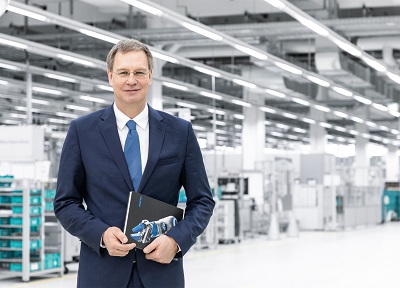The 2020 financial year proved to be a challenging one for Festo, but it also offered a year full of opportunities. According to Dr. Oliver Jung, chairman of the management board, the company proved to be economically stable and has weathered the pandemic well. The Festo Group had to cope with a 7.5% decline in revenue in 2020 due to the pandemic, with a turnover of 2.84 billion euros ($3.4 billion). Overall, however, thanks to forward-looking cost-cutting measures and employment protection, operating profit in 2020 was slightly higher than in the previous year.

“This has enabled us to guide our workforce safely through the crisis year and to create a good basis for being ready for the global economy to pick up again. At the same time, it gives us the financial freedom to invest in our future now as well,” said Jung. As in the previous year, the company’s R&D ratio was 8% of turnover.
In recent years, Festo has invested heavily not only in Europe, but also in the growth regions of North America and Asia. The company’s “local-for-local” approach has ensured stable supply chains, which now function securely globally and locally in the crisis.
“Basically overnight, we were able to change to digital formats for training, customer visits, technical support and remote maintenance of plants. It has been a smooth transition, and by 2025 one-third of our sales will be online,” said Jung.
For 2021, the company expects a catch-up year. “We started the year well, with strong growth in the first quarter. Nevertheless, the end of the pandemic cannot yet be estimated. We are therefore continuing our savings course. At the same time, we continue to invest in our growth and innovation strategy,” he said.
Strategy 2025+
Implementation of the new Strategy 2025+ is in full swing at Festo. The focus is on growth and performance, innovation and future markets, digitalization and artificial intelligence (AI), and sustainability. Digitalization and AI determine the product roadmap with smart and intelligent products which are enablers for energy efficiency and sustainability in customer applications.
There is also a keen focus on future markets. “The structural change in many sectors is clearly noticeable for us, from the electronics industry to electromobility and life tech. Electrification in the automotive industry is gaining massive momentum. We are seeing strong demand for automation solutions for the production of electric vehicles and vehicle electronics as well as battery production. In addition, there is a great demand for qualification in the entire spectrum of electrification. This offers us great growth opportunities for the next few years,” explained Jung.
The LifeTech business segment encompassing medical technology and laboratory automation is booming with growth rates of over 100%. “Our products make an important contribution to fighting the pandemic. Our piezo valves, for example, are used in respirators and ventilators, and our lab automation systems enable high throughput in Covid-19 tests and in vaccine development and production.
“Automation is the prerequisite for us to be able to supply and treat people worldwide quickly, safely and affordably in high medical quality — be it with medicines and vaccines, respirators or medical devices. We will therefore continue to strongly expand our LifeTech business in the coming years,” said Jung. As one example, Festo is continuously expanding its Technical Engineering Center for LifeTech in Boston, which opened in 2018, in order to further develop this promising growth market.
“Another important growth market is technical training. Virtual training saw huge demand during the pandemic,” he continued. Festo Didactic had identified early on trends like digitalization, sustainability, energy efficiency and electrification and set up digital training platforms that address these needs. “We assume that in five years, one-in-two training systems will take place in a digital format.
“We also feel we have a social responsibility, as home schooling plays an important role at the moment,” he said. In the lockdown, Festo Didactic successfully launched its new digital learning platform, Festo LX, for technical education and provided more than 6,500 free copies of the homeschooling version for mechatronics courses in schools.
Sustainability and automation
“As a company and society, we have to manage the balancing act in the pandemic of simultaneously finding ways out of the crisis and focusing our future activities on sustainability. Automation and technical education are key to this. We also have a high social responsibility for sustainable development here,” said Jung. The goal is to gradually develop production in the direction of a circular economy.
With a focus on digitization, AI and energy efficiency, he sees a tremendous future for pneumatics. “At Festo, we are convinced that pneumatics in particular offers massive advantages over electrics in many areas — it is robust, simple and cost efficient — and that no other technology can match it. We are currently developing this further in the direction of smart and digital pneumatics. There is still a lot of potential here,” said Jung.
In 2020, the company has also made great progress internally in climate protection and thus towards its climate target of saving at least 30% CO2 by 2025. Festo has the greatest leverage for climate protection with its customers through the appropriate product selection of pneumatics and electric drives, because around 90% of a product’s lifetime CO2 emissions are generated during product operation and only around 10% during manufacturing. Smart products and services, digitalization and AI are giving new impetus to energy efficiency on the way to CO2-neutral production.
Festo
www.festo.com
Filed Under: Pneumatic Tips